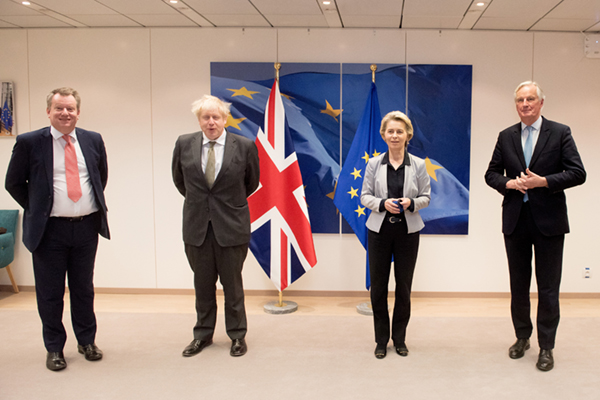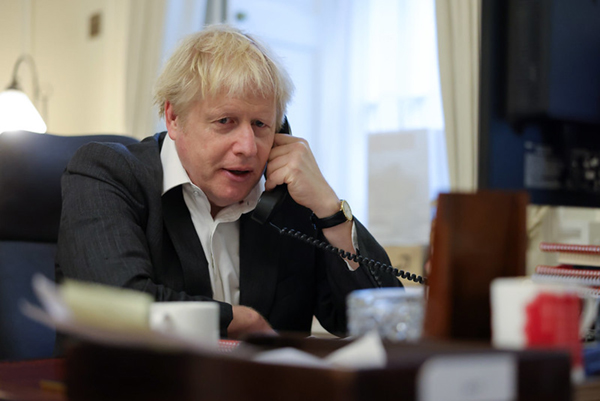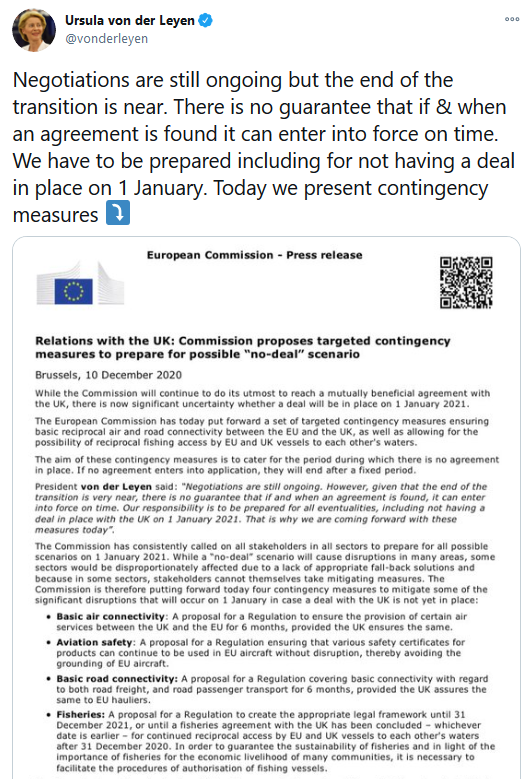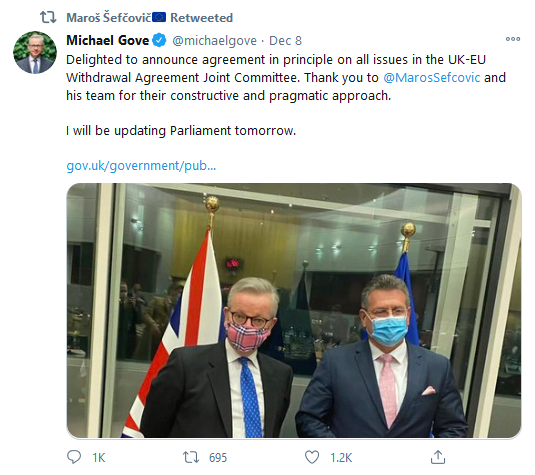Brexit Brief Newsletter
14 December 2020

Welcome to the 14 December 2020 issue of the Brexit Brief
After two phone calls and a dinner in Brussels this week, the UK and EU still haven’t reached an agreement, but they have declared they will “go the extra mile” and continue negotiations. We consider the political meetings which took place over the previous week, the provisional agreement reached in the Joint Committee, as well as a Government update on common frameworks, and readiness for Brexit at Northern Ireland ports.
State of play
Last Monday 7 December, European Commission President Ursula von der Leyen and UK Prime Minister Boris Johnson held a phone call to “take stock of the ongoing negotiations”. They agreed that the conditions for an agreement have not been met due to ongoing differences on three issues: the level playing field, governance, and fisheries. On Wednesday PM Johnson flew to Brussels to discuss these issues in person with Von der Leyen. They held their meeting over dinner (featuring scallops and turbot) and their discussions proved inconclusive: the two leaders agreed that talks should continue until Sunday when a decision would be made about their continuation. The discussion was “lively and interesting” according to von der Leyen’s statement, while a UK source described it as “frank”.

David Frost, Boris Johnson, Ursula von der Leyen, and Michel Barnier meeting in Brussels.
Source: European Commission - Audiovisual Service / Etienne Ansotte
The European Council summit took place on Thursday and Friday in Brussels, where only ten minutes of the EU leaders’ discussions were dedicated to Brexit, amid a heavy agenda including Covid-19, the EU budget, climate change, and foreign relations.
On Sunday, Johnson and Von der Leyen held another phone call, following which they released a joint statement noting that “despite the fact that deadlines have been missed over and over we think it is responsible at this point to go the extra mile”. And so talks continue.

Johnson briefs his cabinet following the call with Von der Leyen.
Source: Andrew Parsons / No 10 Downing Street
This morning EU Chief Negotiator Michel Barnier briefed EU Ambassadors on the state of play of the negotiations. Barnier emphasised that the EU and UK have only been negotiating the trade deal for nine months, while similar previous negotiations have taken five years. It is reported that Barnier told member states that while there has been some movement regarding the level playing field, fisheries talks remain “very difficult”.
 @MichelBarnier on Twitter
@MichelBarnier on Twitter
Sir Ivan Rodgers, the UK’s former ambassador to the EU told Sky news on Sunday that the level playing field “was obviously going to be the sticking point, the potential breaking point…that goes to the heart of what Brexit is for” (in the eyes of Brexiteers). Many commentators would agree, arguing that the talks will likely not fail over fisheries, but that the level playing field is a deal breaker.
European Commission publishes contingency measures
Following the dinner between Johnson and Von der Leyen on Wednesday, the European Commission published its contingency measures for a no-deal scenario to mitigate some of the disruptions which can be expected to occur following the end of the transition period. These include proposals to maintain the provision of certain air services between the UK and EU, proposals covering aviation safety, and road connectivity. Also included is a proposal on fisheries “for continued reciprocal access by EU and UK vessels to each other's waters after 31 December 2020”, a suggestion which has angered Brexiteers.

@vonderleyen on Twitter
“Disruption will happen with or without an agreement between the EU and the UK on their future relationship,” the Commission states. Meanwhile Boris Johnson has been warning that no deal is now “most likely”, stating that "the best thing to do now for everybody… [is to] get ready to trade on WTO terms."
Provisional agreement on the Protocol
The Chancellor of the Duchy of Lancaster Michael Gove and European Commission Vice President Maroš Šefčovič, met in Brussels last week. The co-chairs of the Joint Committee, which oversees the implementation of the Withdrawal Agreement and Ireland/Northern Ireland Protocol, announced that provisional agreement had been reached on all outstanding issues relating to the Protocol. Notably, in light of this solution, the UK has agreed to remove the controversial clauses of its Internal Market Bill relating to the Protocol and will not introduce any similar clauses in the Taxation Bill. It was hoped that this progress could bring some momentum to the trade negotiations, but this has yet to be seen.

@michaelgove on Twitter
Further information about the agreement was laid in Parliament on 10 December. The UK and EU have agreed that Northern Ireland supermarkets will be granted a ‘grace period’ for new checks – three months initially and six months for chilled meat products. It is expected that after this period, Northern Ireland supermarkets would find new sources for such products. The UK will remain fully aligned to EU law on SPS rules for three months, and aligned to rules regarding meat products for six months. After this period, animal and plant products entering NI from GB would need Export Health Certificates (EHCs) and all goods would need import declarations. As Michael Gove put it, “British sausages will continue to make their way to Belfast and Ballymena in the new year."
Goods which “can be shown to remain in Northern Ireland and the UK’s customs territory” will not be subject to tariffs. A trusted trader scheme will exempt a majority of goods flowing between GB and NI from tariffs (reportedly 98% of goods), the remainder could potentially take advantage of a rebate for any tariffs. This scheme would be reviewed after 3.5 years (crucially ahead of the first vote by the NI Assembly on the continuation of provisions within the Ireland/Northern Ireland Protocol). The British Government has announced that a ‘Movement Assistance Scheme’ will cover ‘reasonable costs’ which supermarkets and other businesses incur when moving food stuffs across the Irish sea.
There will be no EU embassy in Northern Ireland, however EU officials will have a presence in the region and will monitor the checks and controls carried out in NI ports.
The agreement was broadly welcomed by stakeholders with the caveat that it does not present a lasting solution to the problems posed by the Protocol and that a trade agreement is essential to mitigate further friction. It is important to note that the derogations apply only to checks on animal and plant products; customs formalities will still apply. Goods travelling from GB to NI will need to have customs, safety, and security declarations, and some checks and controls will be carried out.
Today is the deadline to register for the Trader Support Scheme to receive an EORI number automatically. An EORI number will be required to move goods to and from Northern Ireland after the end of the transition period. DAERA is holding a webinar on EU Exit tomorrow (Tuesday 15 December) at 2pm. The UK Government has announced £400 million for Northern Ireland to support businesses after the transition period and increase the region’s competitiveness.
Taxation Bill
The Taxation (Post-transition Period) Bill was introduced to the Commons last week. The Bill confirms that EU goods entering Northern Ireland will not be charged import duty; the Bill allows the Treasury to regulate for checks and administration processes for goods entering Northern Ireland from Great Britain. ‘Non-qualifying’ goods will be charged a tariff.
Common Frameworks
On Friday the Government published its ninth report on progress on the development of common frameworks. Northern Ireland Assembly Committees have begun the scrutiny of some of the priority common frameworks which are designed as a collaborative approach to address areas where previous EU law intersected with devolved competence. The report states that in parallel to the frameworks process, the government is developing a “cross-cutting” approach to the UK Internal Market. It contends that common frameworks alone cannot guarantee the integrity of the UK internal market (as they are primarily sector-specific) and that the IMB builds upon common frameworks by “providing additional legislative protection to intra-UK trade”.
Readiness for agri-food checks
The Northern Ireland Affairs Committee heard from officials from the Department of Agriculture, Environment and Rural Affairs (DAERA), and the Department of Environment, Farming and Rural Affairs (DEFRA) on readiness for post-Brexit checks on agri-food. DAERA officials stated that they would have the people and basic IT systems in place. They are planning to run the Larne and Belfast ports 24/7 and stated that most of the 25 vets and 75 technical officers are in place. Officials stated that there was a prospect of delays as there are not as many unloading bays as they would like. Arrangements with UK ports, as well as remote and electronic checking of documents, are being used to minimise time spent by lorries at border control posts.
Officials expect that by October next year the facilities will be much better, the processes clearer and businesses and traders will have adapted and become accustomed to the new procedures.
Committee for the Executive Office
The Committee for the Executive Office met with the House of Lords Common Frameworks Scrutiny Committee on Wednesday. The Lords Committee is currently undertaking an inquiry into the common frameworks programme and how it could be reviewed and improved in the future. Committee members informed the Lords about some of the issues they have experienced around the process: the frameworks process began in 2017 when the Northern Ireland Executive was down, Covid-19 has been dominating the agenda since early this year, and information about the process from the Executive Office and from committees is somewhat lacking.
Catch up with the Committees
- Tuesday 8 December, 10.30 am – Plenary - EU Exit Statutory Rules
- Wednesday 9 December, 10 am - Committee for Economy - Update on the Shared Prosperity Fund; EU Exit Secondary Legislation
- Wednesday 9 December, 2 pm - Committee for the Executive Office - Meeting with the House of Lords Common Frameworks Scrutiny Committee; EU funding /participation in EU programmes in the future - Oral evidence from Departmental Officials
- Thursday 10 December, 10 am - Committee for Agriculture, Environment and Rural Affairs - Written Briefings from DAERA on Common Frameworks on (i) Animal Health and Welfare and (ii) Zootechnical Breeding: Provisional Approval and Engagement; EU Exit Legislation; UK Framework Outline Agreement for Radioactive Substances; EU Exit Preparation and Delivery - Oral Evidence from DAERA
- Thursday 10 December, 2 pm - Justice Committee - SR: The Carriage of Explosives (Amendment) (EU Exit) Regulations (Northern Ireland) 2020
This Week at the Assembly
- Monday 14 December, 12pm – Plenary - EU Exit Secondary Legislation
- Tuesday 15 December, 10.30 am – Plenary - Committee for the Executive Office motion - Report on the evidence received from local councils on the impact of the United Kingdom's exit from the European Union
- Wednesday 16 December, 9am - Committee for Infrastructure - Secondary legislation and Common Frameworks– briefing from Department officials
- Wednesday 16 December, 10am - Committee for the Economy - Consideration of EU Exit legislation
- Wednesday 16 December, 2 pm - Committee for Finance - Public Procurement Common Framework
- Wednesday 16 December, 2 pm - Committee for the Executive Office - Oral evidence session with Departmental officials on Brexit; Article 2 of the Protocol on Ireland/Northern Ireland - Joint Committee of Northern Ireland Human Rights Commission and the Irish Human Rights and Equality Commission and the Equality Commission for Northern Ireland
- Thursday 17 December, 9 am - Committee for Health - Departmental Briefing on Brexit; EU Exit Secondary legislation
- Thursday 17 December, 9.15 am - Committee for Agriculture, Environment and Rural Affairs - Oral Evidence from DAERA - EU Exit Preparedness and Priorities for 2021; EU Exit Secondary legislation – written briefings from DAERA; Common Framework for Plant Varieties and Seeds; Common Framework for Fertilisers; Written Briefing DAERA on EU Exit Preparation and Delivery
- Thursday 17 December, 2 pm – Justice Committee - The Civil Jurisdiction and Judgements (Lugano Convention 2007) Regulations 2021



